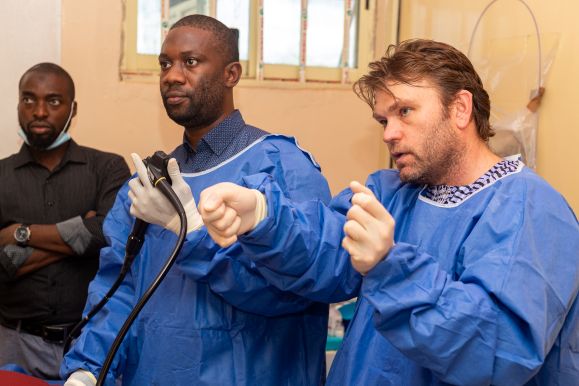Expanding life-saving care in Nigeria
» Go to news mainDalhousie surgeons pioneering colonoscopy training

The incidence of colorectal cancer is increasing at alarming rates in the largest country in West Africa and the most populous area on the continent.
In Nigeria, colon cancer is now ranked as the second most common cancer for men, and third most common for women.
Access to proper screening like endoscopy and colonoscopy, for some, can greatly impact their life.
With populations surging to 200 million, there remains a handful of surgeons trained to perform the necessary procedures to screen for the cancer.
Comparatively, we have far more endoscopists in Nova Scotia with a population of just over one million.
This inequity, and a passion to better understand colorectal cancer in Nigeria, led senior Nigerian endoscopist Prof. Olusegen Isaac Alatise from Obafemi Awolowo University (OAU) in Nigeria and Dr. Peter Kingham from Memorial Sloan Kettering Cancer Center (MSKCC) to establish the African Research Group for Oncology (ARGO) in 2013.
Five years later, while working on his Global Health Disparities Fellowship at MSKCC, Dalhousie’s Dr. Gregory Knapp spent six months in Nigeria with ARGO and Prof. Alatise. When he returned to Dalhousie, he initiated a partnership between ARGO and the Global Surgery Office at Dalhousie where Dr. Knapp is director, and the beginnings of a first of its kind colonoscopy training course in Nigeria.
With a goal to increase endoscopy capacity in Nigeria and entirely supported by Dalhousie’s Global Surgery Office, Dr. Knapp, and fellow Dalhousie surgical colleague, Dr. Richard Spence, along with ARGO partners, designed curriculum to be delivered over nine weeks leading up to the in-person training course. Completed virtually on weekends, the lectures provided participants with theoretical material to prepare them for the in-person portion and gave them a chance to meet the faculty.
“The fact that the Zoom lectures were on Saturdays really shows the commitment from both the faculty and trainees,” says Dr. Spence. “This was after-hours work for everyone involved.”
In April 2024, Drs. Knapp and Spence, along with partners from Yale University and Queen Elizabeth Hospital in Barbados, traveled to Nigeria for a week of on the ground training at OAU. They performed live endoscopies with 18 trainees observing, then supervising them as they practiced the procedures.
Innovation in low-resource settings

The course also included a research component, comparing high- and low-fidelity simulation models, aimed at making endoscopy training more accessible in low-resource settings. Using a randomized study, participants were assigned to either the low-fidelity or high-fidelity models, after working with one, they’d switch and train with the other.
"The cost of industry-made simulators (high fidelity) is high and bringing them to Nigeria adds another layer of complexity,” says Dr. Spence. “The surgeon who built the low-fidelity model used discarded pipes and tubing to create something we could scope and train on.”
Participants were tested before, during, and after working with both models.
“We wanted to test if a lower-cost, locally made model (low fidelity) could provide a similar training experience as industry-sponsored simulators,” says Dr. Knapp. “The results showed promise, especially in a context where cost and scalability are critical.”
Although all 18 participants had basic endoscopy training prior to the course, none performed colonoscopies routinely. A mere month after the course, eight of those trainees were regularly performing the procedure on patients, significantly impacting the healthcare system in Nigeria.
“The course has a profound impact on the delivery of endoscopy services in Osun State (state in southwestern Nigeria),” says Prof. Alatise. “Two new providers are now independent at OAU, which represents a tripling of the pre-existing capacity.”
For both Drs. Knapp and Spence, the project’s impact is personal.
“This work provides context for our local challenges,” says Dr. Knapp. “It’s reenergizing, especially seeing the level of commitment from the faculty and trainees during the course. You come home feeling inspired by their dedication and enthusiasm.”
“The gratitude you see from local trainees, providers, and most importantly, the patients, is remarkable,” says Dr. Spence. “You’re welcomed by people you've never met before, and yet they're so grateful that you're there to help.”
Global health collaborations
Building on the success of this pilot, Drs. Knapp and Spence, along with their ARGO partners hope to deliver a second iteration of the course, recreating and enhancing what worked, with plans to make it an annual offering. As screening endoscopy improves, the expectation is that more patients will present with early-stage diseases, like colon cancer, that could be treated surgically, leading to interest in introducing advanced laparoscopic skills training.
“There’s a lot of potential for this to grow into different avenues, be it in various disease sites or medical techniques,” says Dr. Spence. “With the right support, we can help others adopt colonoscopy and similar techniques that are becoming standard care in more privileged healthcare systems. This was a Dalhousie-sponsored initiative, and it demonstrates our ability to make a global impact.”
This project not only enhances colorectal cancer care in Nigeria but also serves as a model for future global health collaborations, illustrating how Dalhousie can engage with global partners to address health outcomes and inequalities in a sustainable and respectful way.
“Practicing global medicine makes us better locally,” says Dr. Spence. “I learned something during the course in Nigeria about colonoscopy prep that I’ve now applied in my practice here. It’s a good example of how working globally improves our local practice.”
Recent News
- Dalhousie and NCIME launch first‑of‑its‑kind program in Membertou First Nation
- A message from Wanda M. Costen, PhD, Provost and Vice President Academic
- Rhodes scholar Sierra Sparks returns home to study medicine
- President Kim Brooks, Dr. Pat Croskerry appointed to Order of Canada
- Dal’s Highly Cited Researchers reflect on influential global research alliances
- A New Bursary Supporting Black Medical Students at Dalhousie
- Dalhousie’s first physician assistant cohort steps into Nova Scotia’s healthcare system
- Dalhousie med students explore pediatric care in Austria
